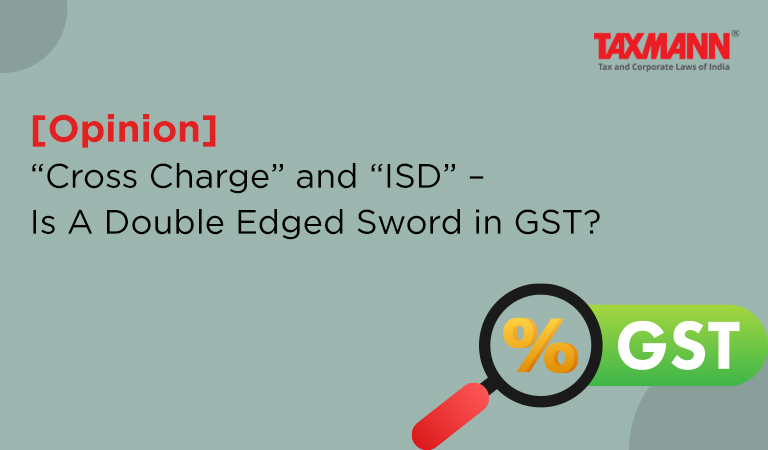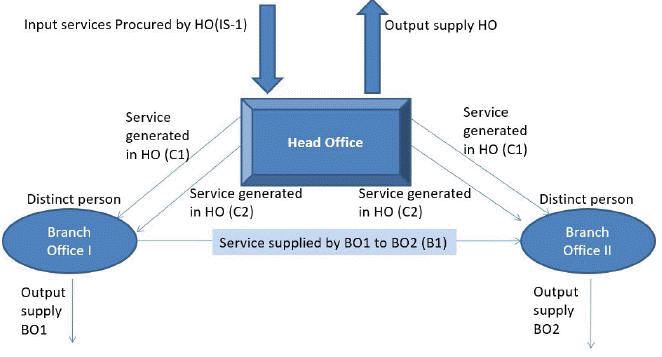[Opinion] “Cross Charge” and “ISD” – Is A Double Edged Sword in GST?
- Blog|News|GST & Customs|
- 4 Min Read
- By Taxmann
- |
- Last Updated on 30 December, 2022

1. Background
In the Current multi locational Business environments, most of the Companies are setting up their Principle Place of business in one State (Head Office/Corporate Office) and Operating their business in different states all over India (Brach Offices). The HO, BOs are having different GST registrations in different states. The common expenditure incurred at HO should be shared to all branches of a Company.
2. What is Cross Charge?
“Cross-charge” is a concept where the GST registration of Corporate Office/HO/ any other office raises invoices on the other offices (having separate GST registration), towards the services provided to such offices. The expression “Cross-charge” is not defined under the GST laws. It is a phrase colloquially referred to in the industry to identify the supplies made between GST registrations of a single person. Wherever the expression “Cross-charge” is being referred in this article, it would mean as reference to the supplies made between distinct persons.

As per Section 25(4) and 25(5) of Central Goods and Services Tax Act, 2017 (“CGST”), where a person has obtained or is required to obtain registration in a state or union territory in respect of an establishment, has an establishment in another state or union territory, then such establishments shall be treated as establishments of distinct persons for the purpose of this Act. Accordingly, cross-charging refers to invoicing the supply of goods or services amongst distinct persons.
As per Entry 2 of Schedule 1 read with Section 7 of the CGST Act, supply of goods or services without consideration amongst ‘distinct person’ is liable to be taxed. GST being a destination based tax, a supply of goods or services amongst the branches of a same entity located across two different states, comes under the ambit of tax. In line with the said provisions, every supply between distinct persons results in cross charge between such entities and will be undertaken by issue of appropriate documents entitling the receiver of the supply for GST credit.
3. Cross Charge & ISD
ISD (Input Service Distributor) and cross charge are different concepts. These two concepts are not alternatives to each although both of these concepts relate to distribution of ITC to distinct persons. In ISD there is transfer of credit attributable to the beneficiary distinct person and in cross charge, there is charging of the goods or services to distinct persons who are the beneficiary of the services directly or indirectly and may not have any input service GST to be distributed. In ISD there is no services provided by the distinct person under the same PAN but is provided by third party.
ISD is for services, whereas the invoices in nature of cross charge can be issued both for goods and services for distribution of credit without ISD registration. If taxable person is not registered as ISD, in that case distribution of credit must be made by cross charge invoice or debit note. Cross charge is mandatory to be followed and GST discharged lest department determines and foists liability of GST u/s 74, with no opportunity to avail credit by the recipient in view of section 17(5)(i).
There are no specific provisions in GST Act or Rules about levy of GST as cross charge. It is the term used when a taxable person provides goods or services to its own constituents having separate registration numbers. In the course of furtherance of business, if taxable person, supplies any goods or services to any other person who is distinct person having registration under one PAN or to a related person as defined in Explanation to section 15, without consideration, as an exception to Section 7(c), it shall be supply liable to GST, if the limit of turnover exceeds threshold limit in respective States.
The combined reading of Entry 2 of Schedule 1 and the concept of distinct persons in section 25(4) and (5) and related persons in Explanation to section 15, when the supply is without consideration , gives rise to the taxability of supply even without consideration. The cross charge is used even when cross charge is with consideration. It means charge levied on distinct person by a distinct person. Thus, based on the provisions as stated above, any supplies between different GST registrations of the same entity, even without consideration shall be termed as a supply and shall attract GST. In line with the said provisions, every supply between distinct persons or related persons, even without consideration, whether charged or not will be liable to GST. Although, the receiver of the supply shall be entitled to GST credit subject to conditions. An important point is that in the case of the inter related persons or distinct persons, any supply or deemed supply (supply without raising invoice for cross charge) even without consideration will be treated as supply and will be taxed on the basis of valuation as per Rule 28.
The Rule 28 does not speak of supply without consideration but speaks only supplies between distinct person or related persons. In all cases that is to say supply with or without consideration it is advisable that the taxable persons raises invoices on the basis of principles of valuation u/r 28 and 30, lest Departmental Assessors are given opportunity of valuation and levy tax on the value based on Rule 28 and 30 and recover tax from the taxable person At the time of levy, it is too late for the recipient to claim of ITC since the claim of ITC is governed by time limitation and also claim of ITC is ineligible u/s 17(5)(i). The prudent practice has to first determine whether benefit of supply of goods and /or services are to other distinct person under same PAN directly or indirectly and secondly to value the same as per principles as per Rule 28, raise invoice on the value and collect GST, and issue tax invoice on the recipient, so that though tax is paid, the recipient is enabled to avail ITC. A taxable person raising invoice on its distinct person may any value if recipient is entitled to full ITC, as provided in 2nd Proviso to Rule 28.
Click Here To Read The Full Article
Disclaimer: The content/information published on the website is only for general information of the user and shall not be construed as legal advice. While the Taxmann has exercised reasonable efforts to ensure the veracity of information/content published, Taxmann shall be under no liability in any manner whatsoever for incorrect information, if any.

Taxmann Publications has a dedicated in-house Research & Editorial Team. This team consists of a team of Chartered Accountants, Company Secretaries, and Lawyers. This team works under the guidance and supervision of editor-in-chief Mr Rakesh Bhargava.
The Research and Editorial Team is responsible for developing reliable and accurate content for the readers. The team follows the six-sigma approach to achieve the benchmark of zero error in its publications and research platforms. The team ensures that the following publication guidelines are thoroughly followed while developing the content:
- The statutory material is obtained only from the authorized and reliable sources
- All the latest developments in the judicial and legislative fields are covered
- Prepare the analytical write-ups on current, controversial, and important issues to help the readers to understand the concept and its implications
- Every content published by Taxmann is complete, accurate and lucid
- All evidence-based statements are supported with proper reference to Section, Circular No., Notification No. or citations
- The golden rules of grammar, style and consistency are thoroughly followed
- Font and size that’s easy to read and remain consistent across all imprint and digital publications are applied



 CA | CS | CMA
CA | CS | CMA

Can you guide me by what date cross charge invoice can be made for FY 2022-23, I have made invoice o n 31-7-2023, but the auditor is insisting in 31-3-2023 , so I will have to pay interest for 5 months
The invoice has to be made as per time of supply provisions for issuing invoice.
Is there a last date to issue cross charge invoice for any particular FY. and please also discuss charge of interest in case of delay in issue of cross charge invoice.
Is there a last date to issue cross charge invoice for any particular FY. and please also discuss charge of interest in case of delay in issue of cross charge invoice.
The same time limit provided for normal invoices would be applicable in this case.
If a person receives common services in headquarters in year 2017-18, can the cross charge invoice for the same services be raised to the branch office in 2019-20
not allowed, time limit is prescribed in law for raising invoice